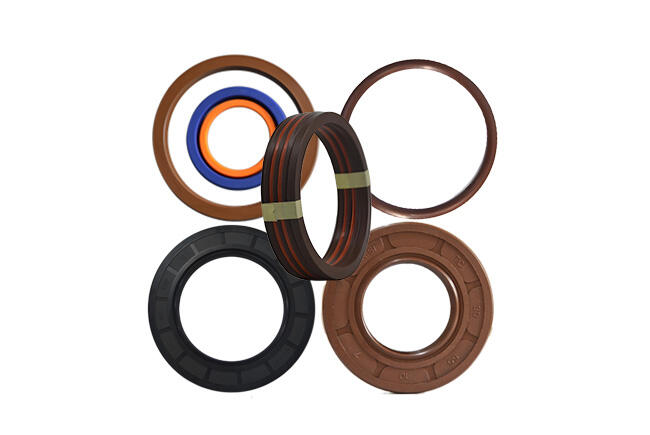사람들이 건설 현장을 지나칠 때 종종 끝없이 회전하는 거대한 믹서 드럼을 눈치채지만, 매우 소수만이 전체 시스템이 신뢰성 있게 작동하게 하는 요소에 대해 생각합니다. 씰링 시스템과 관련된 업계에서 오랜 시간 일한 경험으로 자신 있게 말할 수 있는 것은 바로 믹서는 강철 프레임이나 모터의 문제로 인해 고장 나기보다는, 일반적으로 작은 씰이 제 기능을 잃을 때 작동이 멈춘다는 것입니다.
그렇다면 콘크리트 믹서에는 실제로 어떤 종류의 씰이 사용되고 있을까요? 장비 제조사와 유통업체 모두와 수십 년간 일해온 전문가로서 그 실상을 좀 더 자세히 살펴보겠습니다.
오일 씰스 – 첫 번째 방어선
믹서의 기어박스와 메인 구동축은 회전축 씰의 성능에 크게 의존합니다. 이 부품의 역할은 두 가지입니다. 윤활유를 내부에 유지시키고 시멘트 먼지와 슬러리를 외부에서 차단하는 것이죠. 일반적인 상황에서는 NBR(Nitrile Rubber) 오일 씰이 일반적으로 사용되지만, 믹서가 무더운 여름 온도나 고부하 조건에서 작동할 경우에는 FKM(Fluoroelastomer) 소재가 더 신뢰성 있는 선택이 됩니다. 일부 고중량용 또는 수입 믹서는 금속 케이스가 있는 강화 스켈레톤 오일 씰을 적용하기도 하여, 고속 운전 조건 및 마모성 입자에 대해 안정성을 확보합니다.
O형 링 – 큰 영향을 주는 소형 부품
딜러들은 단일 믹서에 사용되는 오링의 수량을 과소평가하는 경우가 많습니다. 오링은 유압 펌프, 밸브, 파이프 연결부, 플랜지 조인트 등 여러 부위에 사용됩니다. 문제는 성능뿐만 아니라 공급 가능성에도 있습니다. 장비가 고장 났을 때, 아무도 교체 부품을 받기 위해 며칠을 기다리고 싶어하지 않습니다. 바로 이때 NQKSF의 풍부한 재고가 중요한 역할을 합니다. 즉시 공급 가능한 10,000개 이상의 다양한 사양을 보유하고 있어 유지보수 팀과 유통업체는 언제든 필요한 크기의 제품을 빠르게 확보할 수 있습니다. B2B 구매자에게는 이러한 신속한 대응이 곧바로 고객 신뢰로 이어집니다.
유압 실린더 씰 – 고압을 견디는 기술
믹서의 배출 게이트와 호퍼는 유압 실린더에 의해 작동됩니다. 내부에는 피스톤 씰, 로드 씰, 와이퍼, 가이드 링 등이 있습니다. 이러한 씰은 최대 20~35MPa의 압력을 견뎌야 하며, 먼지와 모래, 심지어 화학 첨가제까지 침투하려는 환경에 노출됩니다. 폴리우레탄( PU )과 PTFE는 여기서 흔히 사용되는데, 이는 내구성과 낮은 마찰 특성을 함께 갖추고 있기 때문입니다. 저는 항상 고객님들께 이렇게 말씀드립니다. 와이퍼 실린더를 소홀히 하시면 실린더 전체가 손상될 위험이 있습니다. 일단 슬러리가 침투하면 수리 비용이 고품질 실링 키트 가격보다 훨씬 비싸지게 됩니다.
스켈레톤 실과 조합 실링
주 구동 시스템과 감속 장치에서는 스켈레톤 형태의 실과 고무-금속 가스켓이 안정화 역할을 합니다. 이들은 단순히 밀폐만 하는 것이 아니라 충격을 흡수하여 주변 기계 부품의 수명을 연장시켜 줍니다.

자주 묻는 질문
Q1: "빨리 배송이 가능한가요? 설비 정지가 우리에게 가장 큰 골칫거리입니다."
A1: 이럴 때 NQKSF의 즉시 출하 가능한 재고가 큰 차이를 보입니다. 오링, 오일실, 표준 가스켓 등은 즉시 출하가 가능하여 고객이 장기간의 설비 중단을 피할 수 있도록 도와줍니다.
Q2: "콘크리트 혼합물에 실링을 부식시키는 강력한 첨가제가 들어있으면 어떻게 하나요?"
A2: 표준 부품만으로는 항상 충분하지 않습니다. NQKSF는 재질 선정에서 설계 및 현장 테스트에 이르기까지 맞춤형 전후방 솔루션을 제공하여 비표준 씰을 특수 환경에 맞게 설계할 수 있습니다.
Q3: "제품만 판매하시나요, 아니면 당사의 씰링 시스템 개선도 도와주실 수 있나요?"
A3: 30년 이상의 실무 산업 경험을 바탕으로 NQKSF는 제조에 그치지 않습니다. 많은 고객들이 유지보수 비용을 절감하고 서비스 주기를 연장할 수 있는 시스템 수준의 개선 방안에 대해 전문 팀의 조언을 구합니다.
왜 NQKSF가 차별화되는가
유통업체 입장에서 공급업체를 선택한다는 것은 단지 가격만을 고려하는 것이 아닙니다. 안정성, 기술 역량, 신뢰성도 중요한 판단 요소입니다. NQKSF는 여러 방면에서 신뢰성을 쌓아 왔습니다:
· 자체 제조 시설을 운영하여 품질을 직접 통제합니다.
· 일반 규격에서 비표준 규격까지 완전한 카탈로그와 재고 가용성을 유지합니다.
· 자사 제품이 80개 이상의 국가에 수출되며, 종종 유명 국제 브랜드들과 협력하여 공급됩니다.
· 회사는 성급 혁신 센터, 전문 혁신 기업, 첨단 기술 기업으로 인정받았습니다.
· 지역 내 산업 클러스터에서 NQKSF는 다른 기업들이 본받는 벤치마크 역할을 하는 선도기업으로 평가받고 있습니다.
유통업체의 경우, 이러한 요소들은 안정감으로 이어집니다. 재고는 안전하며, 기술 상담이 가능하고, 브랜드 평판은 최종 고객을 대할 때 신뢰를 더해줍니다.
비즈니스 측면에서 딜러와 도매업체는 내일 출하분이 제때 도착할지, 또는 한 달 뒤 고객이 씰(seal) 고장을 이유로 불만을 제기할지 걱정하고 싶어하지 않습니다. 그들은 빠른 납기를 제공하고, 기술적 지원을 해주며, 맞춤 요청사항도 지체 없이 처리할 수 있는 파트너를 원합니다.
이 때문에 업계에서는 NQKSF를 단순한 공급업체가 아닌 장기적인 비즈니스 파트너로 보고 있습니다. 회사의 접근 방식은 부품 판매에 그치지 않으며, 궁극적으로 고객들이 가장 중요하게 여기는 것은 장비가 현장에서 신뢰성 있게 가동될 수 있도록 유지하는 것입니다.
콘크리트 믹서는 겉보기에는 간단해 보일 수 있으나, 그 신뢰성은 내부에서 조용히 작동하는 다양한 씰들의 협력에 달려 있습니다. 오일 씰, O-링, 유압 실린더 씰, 복합 가스킷 등이 각자의 역할을 수행합니다. 이들 부품이 고장 나면 작업은 중단됩니다.
시장 측면에서, 즉 딜러, 유통업체, 서비스 업체에게 중요한 것은 광범위한 제품 가용성과 맞춤화 능력, 기술 전문성이 결합된 공급업체를 찾는 것입니다. NQKSF는 수십 년간 축적된 노하우와 그 명성이 해당 분야를 훌쩍 넘어선 존재로 자리매김하고 있습니다. 집 시장.
실은 예비 부품 이상의 의미를 가집니다. 이 작은 부품 하나가 믹서의 회전을 계속 보장하고, 프로젝트가 일정에 맞춰 진행되도록 하며, 공급업체와 유통업체 간의 비즈니스 관계가 성공적인 납품마다 더욱 견고해지도록 합니다.
 핫 뉴스
핫 뉴스2024-10-30